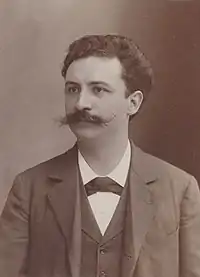
Xavier Henry Napoleón Leroux (11 October 1863 – 2 February 1919) was a French composer and a teacher at the Paris Conservatory. He was married to the famous soprano Meyrianne Héglon (1867–1942).
Life
Born in Italy at Velletri, 30 km south-east of Rome, Leroux was the son of a French military bandleader. He studied at the Conservatoire de Paris under Jules Massenet and Théodore Dubois, and won the Prix de Rome in 1885 with the cantata Endymion. From 1896 he taught harmony there. Notable students include Eugène Bigot, Georges Dandelot, Marc Delmas, Roger Désormière, Louis Fourestier, Henri Mulet, Paul Paray, Louis Vuillemin, and Albert Wolff.
Leroux composed various orchestral and choral works, songs, and piano pieces, but he became known above all as a representative of naturalistic French opera. His masterpiece is the opera Le Chemineau, which was staged six times at the Opéra-Comique between 1907 and 1945.
Alfredo Casella dedicated his Symphony No. 1 in B minor, Op. 5 to him in 1905.
Leroux was married to the Brussels-born soprano Marie-Antoinette Willemsen, who appeared under the pseudonym Meyrianne Héglon (1867–1942).
Selected works
Incidental music
Operas
- Evangéline (Louis de Gramont) (1895)
- Astarté (Louis de Gramont) (1901)
- La reine Fiammette (1903)
- Vénus et Adonis (Louis de Gramont) (1905)
- William Ratcliff (Louis de Gramont after Heinrich Heine) (1906)
- Le Chemineau (1907)
- Théodora (1907)
- Le Carillonneur (1913)
- La Fille de Figaro (1914)
- Les cadeaux de Noël (1915)
- 1814 (1918)
- Nausithoé (1920)
- La Plus forte (1924)
- L'Ingénu (1931)
Others
- Hymne (1914)
References
- Don Randel: The Harvard Biographical Dictionary of Music (Cambridge, MA, 1996), p. 499.
External links